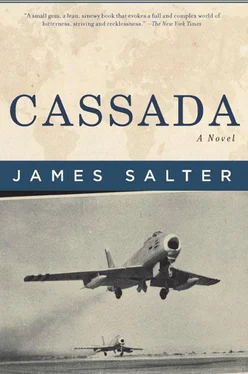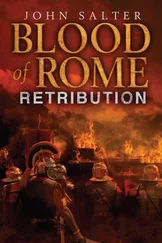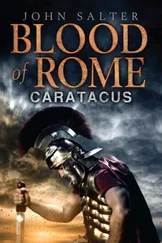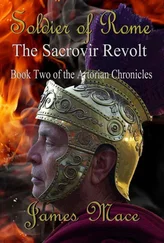Who among them, then, Isbell wondered, someone nearly overlooked, silent and reflective, or another, arguing and intense? Godchaux—he was what it was all about. Grace. The best pilots. Across the room, wedged between men he did not know, was the new one. Fair hair, eyebrows almost joined in the middle. Never trust a man when they come together, they say. As good a rule as any, and the new man, taking it all in, just beginning to select a few idols, Isbell could have picked them out himself, the false glitter.
He emptied his glass and raised a finger for another. It was curious. There were times when he could see them in an entirely different way, for what they were, full of simple courage and youth. Godchaux had a smile that even death would not erase. Dumfries, that idiot, smooth-cheeked and smiling, he had something, too, decent and admirable. There were times when Isbell trusted them all. They were bound together, all of them, he and Dunning too in a great orbit, coming deceptively close to the rest of life and then swinging away. At the extremities were North Africa where they went for gunnery once or twice a year and at the other end the skies of England where great mock battles were sometimes fought. The rest was at home in the Rhineland, rumor, routine, occasional deployments, Munich now and then. They toured the Western world together, stopping at Rome to refuel. Socked in? Divert to Naples—watch the olive trees if you land to the west. Something was usually beginning before the last thing ended. Isbell’s true task was biblical. It was the task of Moses—he would take them to within sight of what was promised, but no further. To the friezes of heaven, which nobody knew were there.
Dunning was drinking coffee and talking to a couple of the crew chiefs. Godchaux and Phipps sat down nearby. It was a cloudy morning. The last flights were landing.
When the crew chiefs had gone, Dunning turned. He examined Godchaux for a moment.
“Mighty sporty today, aren’t we?”
“Sir?”
“Just what are they,” Dunning asked looking towards Godchaux’s feet, “the new Air Force regulation?”
“What’s that, sir?”
“I was under the impression we’d all pretty well agreed on a color.”
“Oh, you mean these.” It was a pair of red socks. “I guess I wasn’t paying much attention. I figured the flying suit covered them anyway. I guess I should change them.”
“I would suggest that you do, Lieutenant.”
Phipps, looking towards Godchaux, was making a darting motion with his eyes.
“Right now, do you mean?” Godchaux asked Dunning.
“Just as soon as possible.”
Godchaux saw it then, the thin band of green and black argyle.
“Yes, sir,” he said.
“Well?” Dunning said. Godchaux hadn’t moved.
“Sir, can I borrow your jeep?”
“No.”
Godchaux stood up.
“Sit down,” Dunning said, not looking at him.
“I’ll change them when I go back at noon,” Godchaux said. “There’s just one thing…”
“What’s that?”
“Do you want me to bring you back a pair, too?”
Phipps smothered a laugh. Dunning stared disapprovingly at him, as at someone who had asked a stupid question. “What’s bothering you?”
“Nothing, sir,” Phipps said, still believing he was part of the fun. Then he lost confidence and changed his expression. He looked embarrassed. He rubbed the tip of his nose nervously. The commander’s moods were unpredictable, the burly figure who had led fighter-bomber missions in Korea, rail cuts far to the north, coming back afterwards, spent and dark with sweat. Dunning didn’t talk about it, he didn’t have to. It was part of his aura.
Cassada came along then, alone, wearing a flight jacket that was too large for him. The sleeves nearly touched his knuckles. He saw Dunning gesture and sat down. How was he making out? Dunning wanted to know. Fine, Cassada said.
“Has Captain Isbell assigned you to anybody for your checkout yet?”
“Yes, sir. Lieutenant Grace.”
“Good. You’ll be in good hands. How about a cup of coffee?”
“No, thank you.”
“What’s wrong? Don’t you drink coffee?”
“No, sir.”
“I never heard of a fighter pilot who wouldn’t drink coffee. What is it, part of your religion or something?”
“It’s the caffeine, Major. I seem to be sensitive to the caffeine.”
“What do you drink?”
“Well, tea sometimes, sir.”
“Tea?”
Ferguson drank coffee. In fact his need for it was pressing. He had landed a few minutes before and had flown with a hangover. The lines imprinted from the oxygen mask were still on his face.
“Feeling all right there?” Dunning asked.
Ferguson was holding the cup in both, almost trembling, hands.
“You look a little pale,” Dunning went on.
“No, sir, Major. I feel fine.”
“Town last night?”
“No, sir, it’s just a little sinus up here,” he touched the bridge of his nose, “that’s all.”
“Maybe you need some tea.”
“Sir?”
“Tea,” the major said.
Ferguson, large and somewhat aimless, was puzzled. Something he had missed. “I don’t think so,” he said glancing around. There was something going on.
When Dunning had gone, Ferguson said, “What was all that about?”
“Ask Cassada.”
“I just said I didn’t drink coffee. The caffeine,” Cassada said.
“He never met a fighter pilot who didn’t drink coffee,” Phipps said.
“I hope you like beer,” Godchaux said.
In the darkness Cassada woke, cold German night outside. It was just past five. The day he had been waiting for was at hand. He wondered what the weather was; it had been clear the night before, stars in a strange heaven. He lay quietly, unable to sleep, going over various possibilities, those he might soon have to face.
He went to breakfast and sat with others but said nothing. He was still not accepted. This day would begin to change that. He was impatient for it. Afterwards things would be different.
Grace met him in operations. Their airplanes had already been assigned. Cassada’s eyes several times went to the numbers written in grease pencil on the scheduling board. Outside, the planes themselves, heavy black cables plugged into them, stood on the ramp.
They went over the emergency procedures: fire warning light, electrical failure, flameout. There was a power unit just outside making a racket. In the next room the operations clerks were using the adding machine. Godchaux and some others were playing hearts. “Smoke the old bitch,” they were crying. “Smoke her out.”
“What if both hydraulic systems go out?” Cassada wanted to know.
“That’s bad,” Grace said.
“Can you move the controls at all?”
Grace shook his head. He had a broad, smooth face and close-cropped hair.
“Not even using the trim?”
“No,” Grace said.
Hearts was the game of choice. It showed your true character. Godchaux had the lead, the last trick lay faceup in front of him. Two hearts had fallen in it, the ace and nine. It was Harlan’s ace. Ferguson was chanting, “Smoke, smoke.”
“Shooting?” Harlan asked.
“Yeah, sure I am,” Godchaux said. He tapped his fingers on the back of his cards.
“Well, is there anything else you can do?” Cassada wanted to know. He had confidence in Grace. He was in no position not to have, but still. “Can you do anything?”
“That’s what you carry a small screwdriver for,” Grace said. “You have one, don’t you?”
“No.”
“You’d better get one before we go up.”
“You mean you can do something in the cockpit?”
Читать дальше












